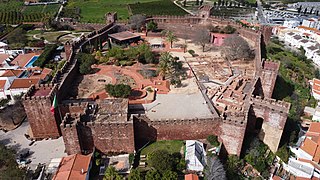
The Castle of Silves is a castle in the civil parish of Silves in the municipality of Silves in the Portuguese Algarve. It's believed that the first fortifications were built upon a possible Lusitanian castro, by the Romans or Visigoths. Between the 8th and 13th centuries, the castle was occupied by the moors who expanded it, making it one of the best preserved Moorish fortifications in Portugal, resulting in its classification as a National Monument in 1910.

The Castle of Carrazeda de Ansiães, normally shortened to Castle of Ansiães, is a medieval castle in the civil parish of Lavandeira, municipality of Carrazeda de Ansiães of Portugal.

The Castle of Castro Marim is a medieval castle on a hilltop overlooking the civil parish of Castro Marim, in the municipality of the same name, in the Portuguese Algarve. The castle was part of the defensive line controlled by the Knights Templar, a stronghold used during the Portuguese Reconquista, and adapted during the Restoration War to defend the frontier.

The Castle of Moreira de Rei is a well-preserved medieval castle located in the civil parish of Moreira de Rei, in the municipality of Trancoso, Portuguese district of Guarda.
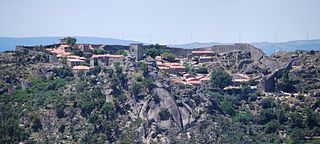
The Castle of Sortelha is a castle in the civil parish of Sortelha in the municipality of Sabugal in the Portuguese Centro region, classified as a National Monument.

The Castle of Alcanede, is a Portuguese medieval castle in civil parish of Alcanede, in the municipality of Santarém, in the Ribatejo district of Santarém.

The Castle of Alenquer, is a Portuguese medieval castle in civil parish of Alenquer, in the municipality of Alenquer, in the district of Lisbon.
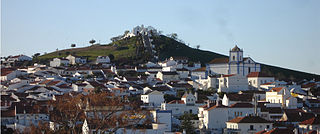
The Castle of Aljustrel is a Portuguese medieval castle in civil parish of Aljustrel e Rio de Moinhos, in the municipality of Aljustrel, in the district of Beja.
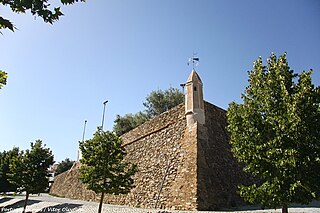
The Castle of Arronches, is a Portuguese medieval castle in civil parish of Assunção, in the municipality of Arronches, in the district of Portalegre.
The Castle of Atouguia da Baleia is a medieval castle in the civil parish of Atouguia da Baleia, municipality of Peniche, and in the Oeste region of the historical Estremadura province.

The Castle of Avô is a medieval castle located in the civil parish of Avô, municipality of Oliveira do Hospital, in the Portuguese district of Coimbra.
The Castle of Barbacena is a former-medieval castle/fort in the civil parish of Barbacena e Vila Fernando, municipality of Elvas in the Portuguese Alentejo, classified as a Property of Public Interest.

The Castle of Vidigueira is a castle in the civil parish of Vidigueira in the municipality of Vidigueira in the Portuguese subregion of Baixo Alentejo. Although constructed in the first half of the 15th century, it is more commonly associated with the first of the Counts of Vidigueira: Vasco da Gama.

The Castle of Mirandela is a medieval castle in the civil parish of Mirandela, municipality of the same name, in the Portuguese district of Bragança.
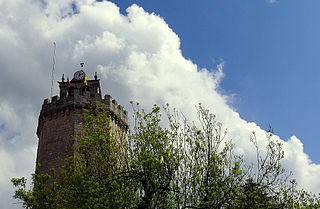
The Castle of Freixo de Espada à Cinta is located in the civil parish of Freixo de Espada à Cinta e Mazouco, municipality of Freixo de Espada à Cinta, in the Portuguese district of Bragança.

The Castle of Penedono is a medieval castle located in the civil parish of Penedono e Granja, in the municipality of Penedono, Portuguese district of Viseu.

The Castle of Santo Estêvão is a medieval castle located in the civil parish of Santo Estêvão, municipality of Chaves, in the Portuguese district of Vila Real. Located in a dominant position over the village, the castle is within walking distance of the course of the river Tamega and the border with Spain.

The Castle of Castelo Melhor is a medieval castle located in the civil parish of Castelo Melhor, in the municipality of Vila Nova de Foz Côa, Portuguese Guarda. The castle is one of the best examples of secondary medieval fortresses, erected in one of the more peripheral zones of the peninsular kingdoms.

The Castle of Castelo Bom is a medieval castle in the civil parish of Castelo Bom, municipality of the Almeida in the district of Guarda in the Centre region of Portugal.

The Castle of Moura is a Portuguese medieval castle in civil parish of Moura e Santo Amador, in the municipality of Moura, in the district of Beja.























